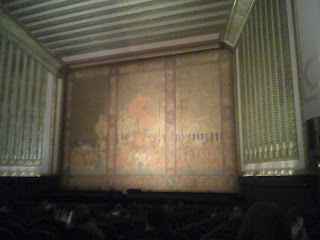Having failed to grow up in one of the largest cities in the country, my only exposure to opera up until high school was through recordings, and while I'm sure they were very good recordings, opera takes place on a stage for a reason. This does not come across on a CD, no matter how many pictures they've managed to cram into the little booklet inside the case. I believe the first proper opera I ever saw was as a senior in high school, when our German teacher bought tickets for her senior class to see the local university's production of Engelbert Humperdinck's Hänsel und Gretel (which, because the university had an attached conservatory, was quite well done). When I was an undergraduate there I went to the operas - one per year, except that one year when they did Sor Angelica and Gianni Schicchi in one performance, which was great, but still not an opera in an opera house with an opera company. I did attend a performance of The Barber of Seville at our local performing arts center, which had brought in an opera company from Bulgaria (warning right there), but that performance - especially the bass who played Doctor Bartolo - was weaker than what I had heard at the university. In short, I'd not been exposed to much proper opera before.
Then I moved to Chicago.
Lest that sound too much like Mecca, I will admit that Chicago is not exactly a world-renowned center for the operatic arts - that honor is reserved for places like New York and Milan - but it does have an opera house, with a resident opera company, and it performs regularly. It also has a student rush ticket program by which a student can get tickets that don't sell for $20. On the main floor. So, naturally, I bit.
I went to see Giuseppe Verdi's Ernani, which is not a well-known opera, but I've always preferred the slightly less conventional. So I bought my ticket a week or two in advance, dressed up (rocking the vest, as usual), and took the Metra downtown. I managed to find the Civic Opera House (stage pictured above) and obtain my ticket with little difficulty. I sat in row W, right side, on the main floor (that picture above is my view from that seat). Not too shabby for $20. Damned uncomfortable seat, though. I suspect they're original to the building (1920s - and you think I'm kidding but I'm not).
As we waited for the first act to begin, I couldn't help but listen to the couple behind me (I was surrounded by couples, it seemed, and wished I had brought my other half along, but he wasn't interested in seeing Ernani). The guy sitting behind me was Italian, the girl American, both obviously students who, like me, had gotten their tickets through the rush program, which is open to all the universities in Chicago (there are quite a few). Although the girl sounded a bit ditzy, she was having a fairly intelligent conversation with her boyfriend (who, despite being Italian, had never been to an opera before) about opera and such. But then the conversation turned to dancing and she mentioned that she had taken dance lessons at one point. She had learned the samba, the rumba, the cha-cha, and the Vietnamese waltz.
"Vietnamese?" he asked.
Maybe it was Venetian, she mused.
He hadn't ever heard of a Venetian waltz either.
It was supposed to be very graceful and dignified, she said.
Silence. Then: "Do you mean Viennese?"
And curtain. (Except not really, because minutes later she tapped me on the shoulder and asked if I could take a picture of her and her boyfriend in their seats. I gladly obliged, though I think they'll find that the dignity of being at the opera doesn't really come across in a poorly lit, over-flashed photo of two white people in dark clothing. None of my business, though.)
At last the curtain rose, and Ernani began. Two intermissions and three hours later I stumbled out into the night. It was a fairly good performance. The soprano who played Elvira (Sondra Radvanovsky, an American) was without a doubt the best part. The central difficulty of opera - and the way in which, in my limited experience, I have seen the most opera performers fail - is that you have to sing and act. Not one or the other, both. Radvanovsky did it, and well - her three males counterparts were all rather wooden by comparison. I won't presume to judge their singing, since I don't know the score well enough, but whenever Elvira was on stage I looked at her, even if someone else was singing, because she was the most interesting thing going on. And the audience agreed with me - Ms. Radvanovsky got far more applause than any of the other performers.
Now the plot, in my humble opinion, is not terribly convincing - though I'll let you read the synopsis and decide for yourself - and I would have been perfectly happy had the entire fourth act been cut. Ernani is one of Verdi's early operas, though I find fault not with the music (which was plenty interesting) but with the libretto, mainly some of the jumps in the plot. We are forced to "suspend our disbelief" in places, and when you combine some singers who don't act very well with a plot that feels forced, you can have trouble. But in any case, I can say I've seen Ernani, I've been to Chicago Civic Opera House, and I had a lovely time. There are some excellent performances coming up in early 2010 - who wants to join me to see Faust?
Saturday, November 21, 2009
Subscribe to:
Post Comments (Atom)

No comments:
Post a Comment